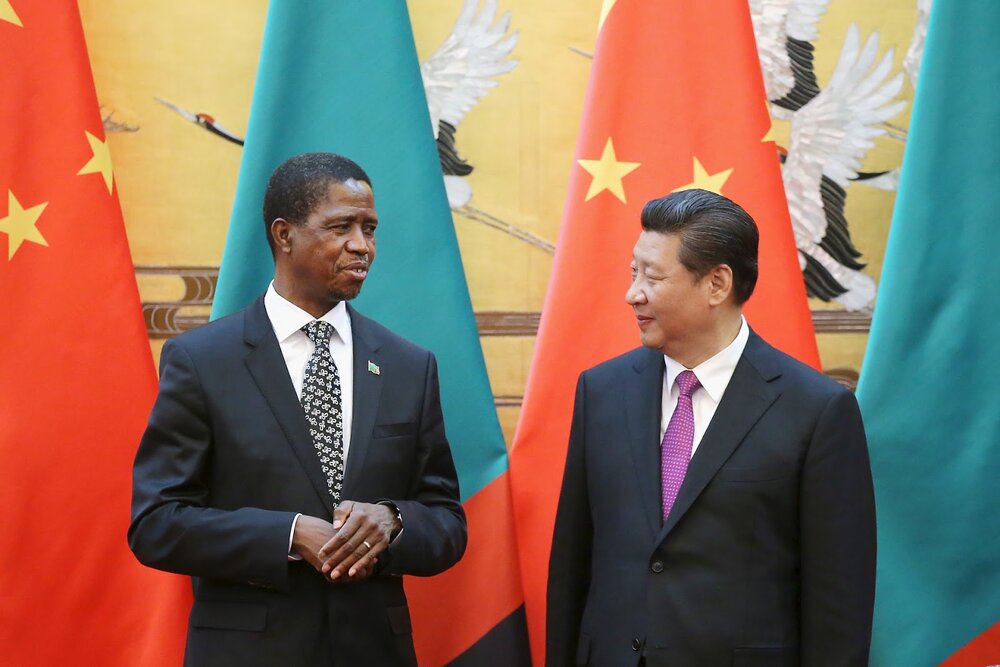China’s Xi Jinping meets with Zambia’s President Edgar Chagwa Lungu in Beijing, China, on 30 March 2015 © REUTERS/Feng Li/Pool
The Euro bondholders’ refusal last week to accept the Zambian government’s new repayment terms for its $3 billion bonds should come as no surprise. The Government of the Republic of Zambia (GRZ) announced that it was seeking to suspend debt interest repayments until April 2021, with no guarantee or plan as to how the government was going to find the money in the meantime.
It does not help that at the moment, details of Zambia’s borrowing, particularly from the Chinese, remain opaque. What we do know is that China’s lending to Zambia is pivotal in the outcome of any potential debt renegotiations.
Conscious of international pressure, the Zambia Ministry of Finance confirmed in a written statement this week that it had asked Chinese creditors to defer interest payments on three outstanding bonds. In response to questions from the Euro bondholders, it replied that the government “intends to share the burden equitably across its official and commercial creditors.”
According to the U.S.-based Brookings Institution in September 2019, loans from China accounted for 65.8% of Zambia’s external debt, an African record. And though China has already indicated that it will use the Debt Service Suspension Initiative (DSSI) to offer temporary relief to the most indebted countries on the African continent, this only affects approximately $140 million — a small percentage of Zambia’s overall debt.
This leaves Zambia standing on the brink of default. The Minister of Finance, Dr. Bwalya Ng’andu, confirmed that Zambia’s sovereign debt now stands at $18.5 billion (104% of the GDP), adding that “Zambia is spending half of government revenue collections to service interest on debt currently compared to [20%] a few years ago.”
Even more worryingly than the Euro bondholders’ refusal, according to EXX Africa, is the looming threat that private creditors will call in their sovereign guarantees and trigger a wave of loan calls. The most obvious target would be the poorly managed power state utility, ZESCO, which supposedly owes 45% of the overall debt. ZESCO is in substantial arrears and is scrambling around to find new sources of revenue. This might explain the government’s shocking moves to expropriate assets of its competitor, Copperbelt Energy Corporation (CEC), with no due cause, freeing up the way to lucrative power supply contracts between ZESCO and the mines in the Copperbelt region.
Zambia desperately needs international support to climb out of this mess. But international finance institutions, led by the International Monetary Fund (IMF), are standing firm. The IMF continues to withhold financial assistance, ostensibly until GRZ commits to transparency, wholesale fiscal reform, and debt sustainability.
This means understanding the true level and conditionality of all the debt owed by GRZ. But increased pressure over debt transparency might reveal an even worse picture for the beleaguered state — not a picture that plays well in the run-up to a presidential election in August 2021.
China could, and should, step in to save Zambia. There are 100,000 Chinese nationals living in the country. China has invested more than $20 billion through companies such as the China Nonferrous Metal Mining Group, PowerChina, China National Complete Engineering Corporation, Aviation Industry Corporation of China (AVIC), Sinohydro Corporation, China Jiangxi International, and China Henan International Cooperation Group. China is dependent on Zambia’s minerals to power its own growth. It cannot afford for Zambia to default.
China has already shown leadership in Angola, where more than $20 billion is owed to Chinese entities. At the end of September, the Chinese Foreign Ministry announced that an agreement on a debt restructuring plan should be ready to sign soon. It has also, through the state-owned Export-Import Bank of China, helped Angola apply to the International Monetary Fund for emergency financial assistance.
Beijing has dealt with its debtors in Angola in a manner consistent with a great power. Expressions of global diplomatic and commercial power carry responsibility. China needs to protect the nations within its orbit from fracturing even further. It is not just in China’s economic interest to pull Zambia away from the default precipice. It is also in China’s moral interest.
After a tough year due to the pandemic, maybe this is China’s soft power opportunity. If it is seriously positioning itself as the successor to the U.S., its Belt and Road initiative is not enough. That doesn’t mean it needs to develop a Sino-McDonald’s or Hollywood. It needs to develop its own ways to win hearts and minds. By showing compassion when needed. By building true partnerships. By understanding when countries are on the brink. By showing leadership in Africa. Now is the time for China to step up.
This piece was first published in SupChina on 9 October 2020.


